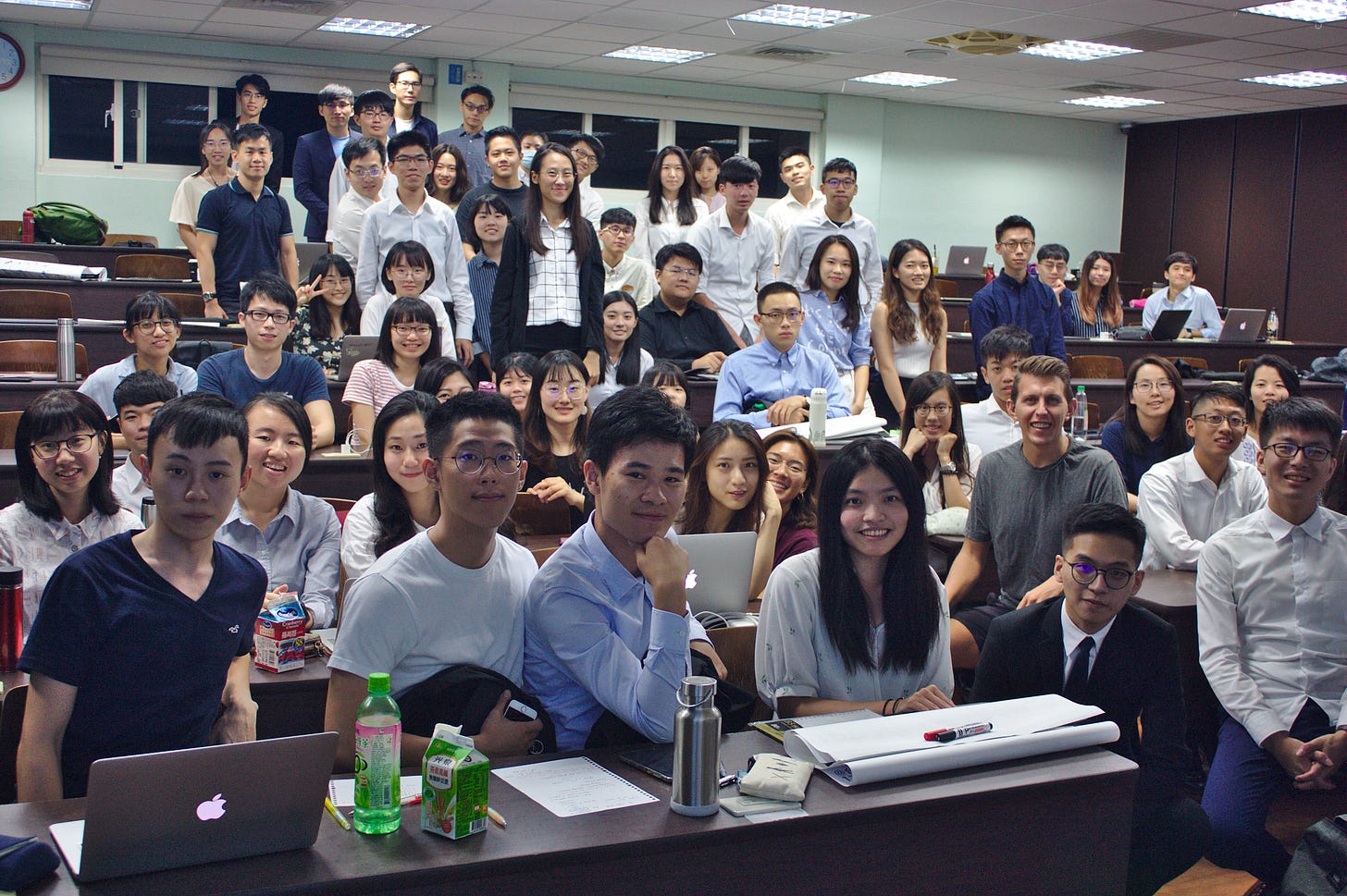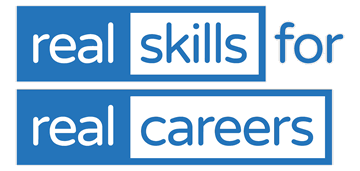#71: "Real Skills", Fake Career Paths, Mentors & Emotions
😎 Reflections on life, work & what matters
October 17th, 2019: Greetings from Taipei! A shot from a workshop I ran with National Taiwan University last week on consulting skills!

👋 Welcome aboard Elia, Peter, Giuseppe, Ben, Angie, Luke, Ted, Ula, Chee Siong, Tamatha, Josh, Reanna, Tim, Phil, Andrew, Josh, Sarah, Ajit, Sheikh
👊 Want to support this newsletter? You can find ways to support here
🙏 Forward this to a friend who might get a kick out of it via e-mail, share on twitter or #1 Beyond “High Skill” & “Educated”


A friend pointed out last week that I implied that “real skills” were the ones that help you land a job to make more money and that the lack of these skills implies a lack of worth. I appreciate him pointing it out mostly because words like “skills” and “educated” are incredibly muddy as they are used in the context of the future of work.
At one end, many people with college degrees may indeed be “educated” and working in what we call “high-skill” jobs but are often unable to use the literature, writing or engineering skills they mastered at school and instead find themselves hacking pivot tables and vlookups while sending rapid fire e-mails. From the book gigged, Peter Drucker saw this in the 1970s:
The jobs had not gotten more complex; the individuals working in them had. In other words, “knowledge worker” was the name for an overeducated office worker—someone whose capabilities far exceeded his or her position. “They expect to be ‘intellectuals,’ ” Drucker writes. “And they find that they are just ‘staff.’
On the other end of the spectrum, we have a disconnect between people that have tremendous human capacity, but the market does not deem any of what they might have to offer as “skills.” David Graeber calls these jobs “shit jobs” and notes that people in them often are doing things of tremendous value to society.
"typically involve work that needs to be done and is clearly of benefit to society; its just that the workers who do them are paid and treated badly"
Think of home health care workers, retail workers, cleaners, uber drivers, delivery people and others get stuff done. In addition you have people that take care of children or their aging parents who perhaps are the highest skilled of all.
Most people accept the logic of the market. Andre Gorz argues that we tend to see things like skills only through the lens of a job or work that can be paid for:
“it has to be a job, a profession: that is to say, the deployment of institutionally certified skills according to approved procedures”
So when I talk about “skills” in the high-skill vs. low-skill dichotomy, it is very much in the “institutionally certified skills” context.
Another common dichotomy used in conversations about work is to discuss “educated” people, or people with college degrees.
As someone with parents who don’t have college degrees, I’ve always cringed anytime I heard someone use the word “educated” - yet I’m sure I’m guilty of using that breakdown myself.
Much of how we talk about these things is shaped this way because we take cues from economists who write research reports about things called jobs. I believe the emergence of new models of working, the realities of the gig economy and the shrinking of the workforce will force us to look past the job and to look past skills and start seeing people as the wonderful beings they are.
Instead of skills, maybe its time we say “institutionally certified skills”
and instead of educated, maybe we start saying “credentialed”
#2 “Give Yourself An A”

I love this idea from The Art of Possibility (h/t John M) from Ben and Ros Zander. In one of Ben’s classes (he teaches music), he decided that he would let everyone in the class give themselves an A. What they had to do is write a letter as themselves from the end of the semester starting, “Dr. Mr. Zander, I got my “A” because…”
The goal is to help them move beyond metrics and grades and instead focus on the person they aspire to be. The Zanders were always looking for ways to expand the imagination and possibility for their students:
When we give an A we can be open to a perspective different from our own. For after all, it is only to a person to whom you have granted an A that you will really listen, and it is in that rare instance when you have ears for another person that you can truly appreciate a fresh point of view.”
#3 Fake Career Paths
I’ve been exploring different industries that have added countless levels and paths within their organizations. While some of this makes sense as business has gotten more complex, some of it is also a way to hide the fact that there are not as many options to be promoted very high in the organization and that overall growth rates have slowed across many industries.
In one of my previous firms, we were only getting growth out of slight price increases every year and no one ever talked about the implications for promotions.
Within a consulting firm, there are now many levels:

Beyond the default path, consulting firms now have non-Partner paths, expert paths and knowledge paths. The odds of becoming a Partner compared to the past are much much lower.
In Academia things are even more competitive, where most of the faculty jobs are non tenure track positions:
Some 73 percent of all faculty positions are off the tenure track, according to a new analysis of federal data by the American Association of University Professors.
Here is an example from Law:
“To me there’s not much of a difference between what I’m doing now and what I would be doing in a partner-track job,” said Mark Thompson, 29, who accepted a non-partner-track post at Orrick, Herrington & Sutcliffe when he could not find a traditional associate job. “I still feel like I’m doing pretty high-level work — writing briefs, visiting client sites, prepping witnesses for hearings.”
I’d be curious to hear from others. Have you seen career paths explode in your career? What other industries share some of these issues?
#4 Startup Gimlet & Spotify
I’ve been fascinated by Gimlet, the podcast company started by Matt Lieber and Alex Blumberg and their show Startup.
Hearing from two founders who care deeply about their company and their people and seeing their emotional journey through the podcast is one of the most intimate looks at what really happens inside a company and in a business.
I found myself a bit emotional at the end of their latest episode, Exit, where they walk through selling their company to Spotify.
When we read about companies we often see the headlines, “Gimlet sells to Spotify for $230” but we never really see behind the scenes and even rarer still, we never see the emotions of the people.
Seeing their journey from the beginning in all its true colors has been one of the most fascinating insights into startups and companies. From Alex’s awkward attempts to raise money to Matt’s nervous asks for more equity, to them being unable to sleep in the final nights of the deal, we’re reminded that in business everyone is just playing a role.
Alex’s wife and fellow executive, Nazanin reflecting on the journey:
We built this thing we made up a lot of stuff, called ourselves executives, gave ourselves titles and were running this company and that’s going to end.
This is beautiful. In this one quote she captures the essence of what business should be about: its all a somewhat made up game that’s going to end, but we might as well have fun along the way
#5 Mentors
I’ve never been very active in seeking out advice from mentors in any systemic way. I’m more a fan of cultivating friendships and hoping those people inspire me along the way. Here is Derek Sivers on another way to think about mentors
Before sending it, I try to predict what they’ll say. Then I go back and update what I wrote to address these obvious points in advance. Finally, I try again to predict what they’ll say to this, based on what they’ve said in the past and what I know of their philosophy.
Then, after this whole process, I realize I don’t need to bother them because the answer is now clear.
If anything, I might email to thank them for their continued inspiration.
#6 Get Advice From People That Make Tradeoffs
People seem to agree

That’s all for this week. Have a good weekend!

Want to Support Boundless? All of the options here
🙋♂️ If you want to learn more about who I am or what I’m working on, find me here. Have a good weekend 😃If you aren’t subscribed to the e-mail, join us here:




